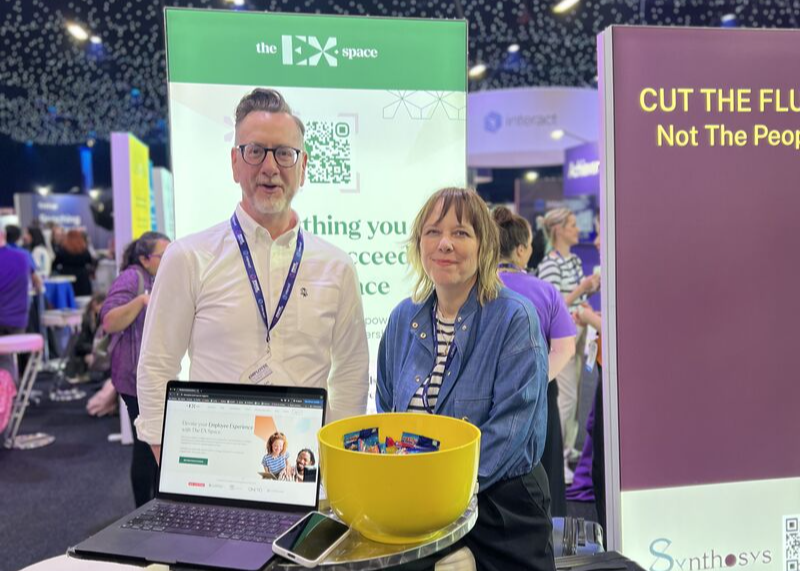People before platforms: Takeaways from the 2025 Employee Engagement Summit

Lee Smith
Minutes
30th May 2025
Employee Engagement
Tech
AI
Innovation
Future of work
Tech
AI
Innovation
Future of work
Last week’s Employee Engagement Summit at Evolution London
brought together over 2,000 people professionals and more than 250 speakers—all
united by a common goal: to reimagine how organisations connect with their
people in an era of rapid change, relentless disruption, and rising
expectations.
The central theme— Redefining How Organisations Connect With
Their Employees —set the tone for a day rich in insight, inspiration, and, at
times, uncomfortable truths. Across six expertly curated stages, a stellar
lineup of speakers explored the tension and opportunity that exists at the
intersection of technological acceleration and human engagement.
Despite the plethora of tech solutions showcased in the glitzy exhibition area, the event fundamentally centred on people. A consistent emphasis was placed on the elements that truly engage individuals: culture, purpose, values, authenticity, storytelling, listening, and wellbeing.
A recurring theme was the potential of AI to enhance engagement—from personalised employee journeys to predictive analytics that uncover hidden trends. Numerous tech solutions promised these capabilities. However, a crucial and ever-present caveat emerged: technology is a tool, not the solution.
This sentiment was echoed by Nikki Humphrey, Chief People Officer at Virgin Group, who stated: “AI can help us be more efficient—but only people can make work more meaningful.”
Our co-founders, Emma Bridger and Lee Smith, are currently exploring this interplay between technology and humanity in their upcoming Kogan Page book, People-First Internal Communication. They argue that now, more than ever, we need to double down on what it really means to be human – embrace the efficiency that AI promises, but focus on empathy.
AI can scale and expedite engagement efforts, but it cannot replace the relational foundations of connection, culture, and care. Striking the right balance—combining intelligent automation with intentional humanity and deep human strengths—has emerged as a critical capability for the future.
If one idea resonated above all, it’s that successful engagement now hinges on leadership that listens, learns, and leans in. Empathy, vulnerability, and authenticity were hailed not as soft skills, but as vital human power skills—fundamental to building inclusive, resilient, and high-performing cultures.
With hybrid work now standard for many, internal communication was framed as both a critical enabler and an evolving professional discipline. Listening to the IC-focused speakers, it was clear that the focus is gradually shifting from broadcasting updates to building community, driving dialogue and connection, and amplifying employee voice. After years of talking about it, it seems the shift is finally happening.
Innovations in multichannel delivery, personalisation, and AI-powered insights were showcased, but the human element remained reassuringly centre stage: relevance, trust, and meaning are what turn information into engagement. The role of internal communicators in enabling human connection is more vital than ever.
The event also underscored the need to move beyond 'hygiene factors' and focus on making work more human. Sessions on recognition highlighted how outdated, one-size-fits-all schemes fail to deliver real impact. Employees today expect rewards that are personalised, timely, and aligned with their values.
Several case studies demonstrated how tailoring recognition to what matters most to individuals—whether that’s public praise, meaningful perks, or purpose-driven contributions—can dramatically boost engagement and retention. And that means knowing what makes individuals tick.
Leaving the event after a full-on day, we were left with a strong sense that, as technological change intensifies, people still matter. As Des Mhere, Global Chief People Officer at the British Army, aptly noted: “You can automate feedback, but you can’t automate trust.” The bottom line? Augment, don’t abandon, the human element.
Yes, AI and automation are here to stay—and they offer incredible opportunities to free up time, surface insights, and enhance the employee journey. But engagement can’t be downloaded. Trust can’t be programmed. And culture can’t be copied and pasted.
As we look ahead, the most successful organisations will be those that blend technological intelligence with emotional intelligence—creating workplaces where people feel heard, valued, and inspired to thrive.
Despite the plethora of tech solutions showcased in the glitzy exhibition area, the event fundamentally centred on people. A consistent emphasis was placed on the elements that truly engage individuals: culture, purpose, values, authenticity, storytelling, listening, and wellbeing.
A recurring theme was the potential of AI to enhance engagement—from personalised employee journeys to predictive analytics that uncover hidden trends. Numerous tech solutions promised these capabilities. However, a crucial and ever-present caveat emerged: technology is a tool, not the solution.
This sentiment was echoed by Nikki Humphrey, Chief People Officer at Virgin Group, who stated: “AI can help us be more efficient—but only people can make work more meaningful.”
Our co-founders, Emma Bridger and Lee Smith, are currently exploring this interplay between technology and humanity in their upcoming Kogan Page book, People-First Internal Communication. They argue that now, more than ever, we need to double down on what it really means to be human – embrace the efficiency that AI promises, but focus on empathy.
AI can scale and expedite engagement efforts, but it cannot replace the relational foundations of connection, culture, and care. Striking the right balance—combining intelligent automation with intentional humanity and deep human strengths—has emerged as a critical capability for the future.
If one idea resonated above all, it’s that successful engagement now hinges on leadership that listens, learns, and leans in. Empathy, vulnerability, and authenticity were hailed not as soft skills, but as vital human power skills—fundamental to building inclusive, resilient, and high-performing cultures.
With hybrid work now standard for many, internal communication was framed as both a critical enabler and an evolving professional discipline. Listening to the IC-focused speakers, it was clear that the focus is gradually shifting from broadcasting updates to building community, driving dialogue and connection, and amplifying employee voice. After years of talking about it, it seems the shift is finally happening.
Innovations in multichannel delivery, personalisation, and AI-powered insights were showcased, but the human element remained reassuringly centre stage: relevance, trust, and meaning are what turn information into engagement. The role of internal communicators in enabling human connection is more vital than ever.
The event also underscored the need to move beyond 'hygiene factors' and focus on making work more human. Sessions on recognition highlighted how outdated, one-size-fits-all schemes fail to deliver real impact. Employees today expect rewards that are personalised, timely, and aligned with their values.
Several case studies demonstrated how tailoring recognition to what matters most to individuals—whether that’s public praise, meaningful perks, or purpose-driven contributions—can dramatically boost engagement and retention. And that means knowing what makes individuals tick.
Leaving the event after a full-on day, we were left with a strong sense that, as technological change intensifies, people still matter. As Des Mhere, Global Chief People Officer at the British Army, aptly noted: “You can automate feedback, but you can’t automate trust.” The bottom line? Augment, don’t abandon, the human element.
Yes, AI and automation are here to stay—and they offer incredible opportunities to free up time, surface insights, and enhance the employee journey. But engagement can’t be downloaded. Trust can’t be programmed. And culture can’t be copied and pasted.
As we look ahead, the most successful organisations will be those that blend technological intelligence with emotional intelligence—creating workplaces where people feel heard, valued, and inspired to thrive.
Diary date – details to follow
If all this resonates with you, why not join us on 25
June at 3:30pm BST for the launch of our ground-breaking new white paper,
AI, Human-Centred Design & the Future of Work.
This isn’t just a webinar. It’s a rallying cry for every HR, EX, L&D or internal comms professional who’s ready to lead—not lag behind. You’ll learn:
✅ Why AI will amplify your impact—not erase your role
✅ How to become a strategic EX Designer—starting today
✅ The 5 most powerful human skills that will define your future
🎁 Every attendee gets exclusive early access to the white paper + practical tools to help you lead the transformation.
This is the future of our profession. Claim your place in it.
Please stay tuned for details.
This isn’t just a webinar. It’s a rallying cry for every HR, EX, L&D or internal comms professional who’s ready to lead—not lag behind. You’ll learn:
✅ Why AI will amplify your impact—not erase your role
✅ How to become a strategic EX Designer—starting today
✅ The 5 most powerful human skills that will define your future
🎁 Every attendee gets exclusive early access to the white paper + practical tools to help you lead the transformation.
This is the future of our profession. Claim your place in it.
Please stay tuned for details.

